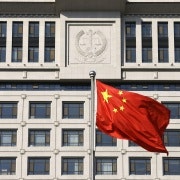Australia and China begin the great thaw
Last weekend, the biggest ever concentration of Australian business and political leaders to visit China converged on the tropical island of Hainan to attend the Boao Forum for Asia annual conference. Prime Minister Julia Gillard commenced her second visit to China in two years at Boao. A new business-to-business forum, the Australia-China Senior Business Leaders’ Forum, was launched.
As these things go, the Boao segment of the prime minister’s visit was routine diplomacy – meet senior Chinese leaders, other heads of governments, make a keynote speech. Importantly, this year, China’s new leader, President Xi Jinping, attended Boao. This gave the prime minister, along with some 10 other heads of government and state, an opportunity to meet Xi early in his term.
The main announcements – Westpac and ANZ being authorised to deal in China’s currency, the renminbi, and the long-touted, much-mooted high-level dialogue between the two countries – were held over for the Shanghai and Beijing stops, respectively.
For Australia, the singular event of the Boao Forum was the inaugural meeting of the SBLF. The SBLF’s genesis was at Boao 12 months earlier when no Australian government minister and only a handful of senior Australian business figures attended. Long concerned to put more substance into the bilateral relationship, Fortescue Metals chairman Andrew Forrest began discussions on bringing the two side’s business communities together into a body that would meet regularly.
The SBLF’s purpose is to build trust and understanding between our respective business communities; establish high-level networks that can help each other in doing business; find concrete solutions to problems and identify new areas of business opportunities; bring advice to governments about managing the bilateral relationship; and act as an early-warning system for governments and the business community more generally.
A preparatory meeting was held in Beijing at the end of July last year and the concept was blessed by the then Chinese vice premier, now a member of the supreme political body – the seven-person Standing Committee of the Communist Party. It was agreed that Forrest and chairman Li Ruogu of China EXIM Bank would be the SBLF’s co-chairs.
Held at Boao, 10 leading Australian company chairs and chief executive officers and ten from China attended. The Chinese side included a former chairman of the Energy Commission and vice chairman of the National Development and Reform Commission, Zhang Guobao. As this was a purely business-to-business meeting, the Chinese side also included some private sector firm representatives.
The agenda was deliberately set to encourage wide-ranging and, most importantly, as far as such meetings go, unscripted interventions. This served its purpose well and discussion was open, lively and at times vigorous, but above all in the sprit of respect and understanding.
Much of the discussions dealt with issues of direct interest to business. For the Chinese side, conditions for Chinese direct investment were paramount. Issues raised were the usual ones of Foreign Investment Review Board, changing taxation rules, supply of skilled labour and infrastructure constraints. As the discussion proceeded, the matter of perceived negative "public sentiment” in Australia towards Chinese investment emerged as a major concern.
Much of the ensuing discussion then dealt with issues of public perception in Australia of Chinese firms. It was suggested that the Australian public did not understand China’s state-owned enterprises and therefore were sometimes suspicious and mistrustful of them. The Australian side also pointed out that the recent heightened concerns over cyber attacks, with China being seen – rightly or wrongly – as the main culprit, also damaged China’s image.
The Chinese side for its part felt that its companies were often “demonised” by some foreign governments and media and that ideological and sometimes protectionist sentiments were behind this. The Australian side noted that it was hard to make the case for Chinese foreign direct investment when in a number of key sectors, such as financial services, China itself was so closed.
The Chinese side acknowledged that it had learnt from some of its investment disasters and were now much more open to taking minority positions and being more strictly commercial when assessing investment opportunities.
As the discussion continued, it was increasingly obvious that much more needs to be done to build trust between our business communities and this will require deeper understanding of each other. The SBLF participants saw that the forum itself could play a leading and critical role in contributing to this. But much more also had to be done by governments.
Ultimately, this was a discussion not so much about foreign investment – and in fact much more was discussed, including regional security, culture and philanthropy – but rather one about trust and the misperceptions and misunderstandings that can arise when this is lacking. Clearly the SBLF felt it was and has set about identifying an agenda of forward work to address this.
Geoff Raby is co-Secretary General of SBLF and a non-executive director of FMG. He is also chairman and CEO of Beijing-based advisory firm Geoff Raby & Associates, and a former Australian Ambassador to China, and vice chairman of Macquarie Group China.
















